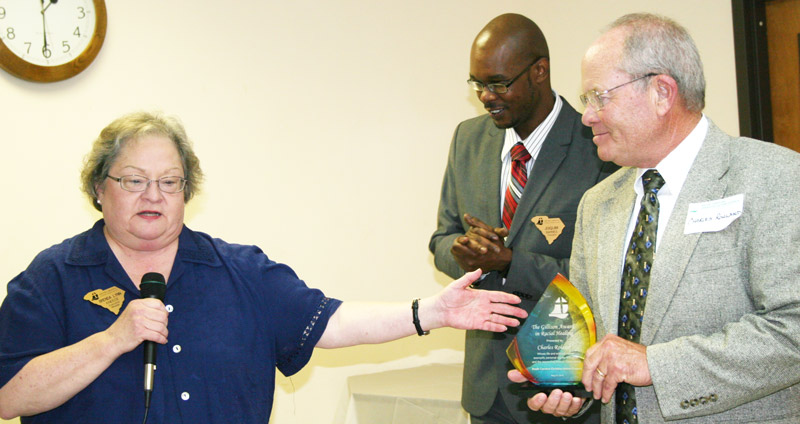
COLUMBIA—More than 50 years have passed since an era when buses, businesses and schools were segregated and black people risked their lives to register to vote.
Those particular struggles are over, but others remain, ranging from a national concern over police shootings of unarmed black men to a widening economic gap between the rich and poor.
About 100 clergy and lay people reflected on history and what still needs to be done at the annual meeting of the South Carolina Christian Action Council held May 21 at Emmanuel African Methodist Episcopal Church in Columbia. The meeting, “Racial Justice and Healing: The Struggle Continues,” focused on an ongoing topic of race relations that has been part of the council’s mission for the past several years .
Betty Deas Clark, pastor of Mount Pisgah AME Church in Sumter, opened the session with a passionate sermon encouraging people of faith not to use anger when dealing with racism. She said watching news coverage of shootings and protests in Ferguson, Baltimore and North Charleston can be disheartening, but violence is not the answer.
“I can’t fight with hatred … I can’t give evil for evil and love God,” she said. “Healing will come when we begin to fight the real enemy and not each other.”
Carl Evans, former president of the Christian Action group and the retired head of the Department of Religion at USC, recalled participating in the 1965 civil rights march from Selma to Montgomery. He said attempts to solve current problems won’t be effective until more people understand that, in many situations, “the playing field is very different for black people and white people.”
“We need to be honest with ourselves,” he said. “We can’t pursue justice unless we are willing to have that conversation and put that ugly truth on the table.”
Bakari Sellers, a member of the S.C. House of Representatives, described growing up as the son of Cleveland Sellers, a civil rights activist who was involved in the protests that surrounded the 1968 Orangeburg Massacre at South Carolina State University.
“My generation is blessed by the struggle of those who came before us. I look at the years since then and I realize we’ve made progress but still have a long way to go,” Sellers said. “You look at the TV screen and see scenes from Ferguson that look like protests in Cairo. The question we have now is we can have chaos or we can have community.”
He said growing economic disparity widens gaps of understanding between people and is quickly becoming a defining issue. His words echoed some of what Pope Francis has said about the need to address the plight of the poor.
“The challenge of my generation is the difference between the haves and the have-nots,” Sellers said. “If you’re poor and black or poor and white in Bamberg County, you have a lot of the same problems.”
Father Sandy McDonald, vicar for ecumenical and interreligious affairs, said the meeting offered an important chance for people from different denominations to discuss ways to promote dialogue.
“It’s … important to realize that we may have made some progress in regard to race relations, but the obstacle nowadays is not merely skin color but also lack of economic opportunity,” he said.
Miscellany photo/Christina Lee Knauss: Brenda Kneece (left), executive minister for the South Carolina Christian Action Council, presents the Gillison Award for Racial Healing to Charles Rowland of Walterboro (right) for helping to increase interracial dialogue, while the Rev. Joiquim Barnes looks on during the Council’s annual meeting.

